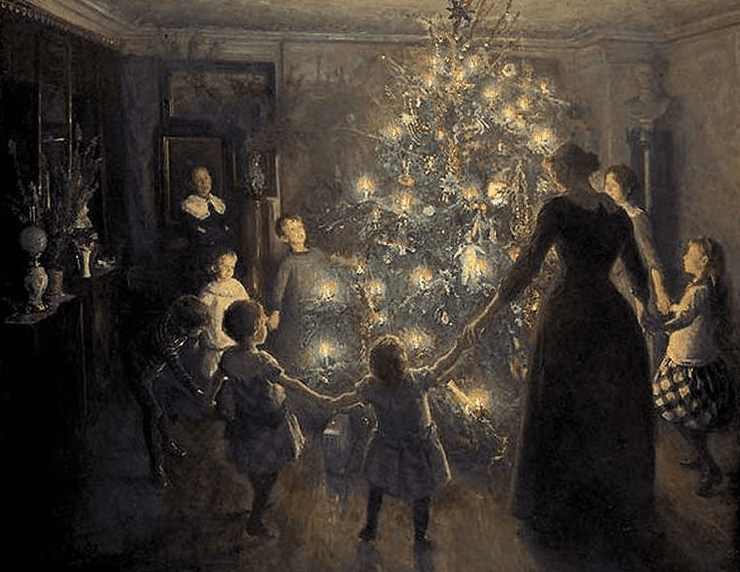Introduction: In this article, Gena Philibert-Ortega provides some helpful tips for conducting oral interviews with your family members this holiday season so that you can record those family stories. Gena is a genealogist and author of the book “From the Family Kitchen.”
It’s that time of the year when families gather, break bread, and take part in age-old holiday traditions. There’s no better time than the holidays to pursue family history! Think about it: everyone is together and they are having conversations that begin with “remember when…” It’s the perfect time to take advantage of those memories and conduct some interviews.
This article will give you some helpful tips for conducting oral interviews with your family members this holiday season so that you can record those family stories.

“Interview” seems like such an official name for what you really want to do: capture the stories and memories of family young and old. Young family members?! Of course! Ask them questions about their lives and memories now so that they can benefit when they are older.
You say you’re convinced that it’s a good genealogy idea to take advantage of an upcoming family gathering – but how do you actually conduct interviews with your relatives? The following steps will help you take action and preserve those family memories for the future.
Get Your Interview Plan Ready
Decide from the start what you want to know about your family history. Will your family interviews be strictly with the older generation and involve them recalling their lives thus far? Will the interviews center on a theme and everyone in the family will be involved (for example: tell us your favorite holiday memory)? Maybe you’ll put together index cards of prompts and then invite family members to spend some time in an “interview booth” (maybe a spare room) and answer questions while speaking into a video camera. First, decide what you want to know and whom you want to participate.
Now that you have a plan, make sure you let everyone know ahead of time. Not everyone likes to be photographed or recorded. Your family history interview questions, even seemingly benign ones, may bring up bad memories. Remember that answering endless questions can be tiring, so decide what will be asked, of whom, and how long it will take. Let everyone you are interviewing know so that they can be prepared and not feel put on the spot. This might also allow them time to find and bring heirloom items, photographs, or other family memorabilia to share. (Make sure to bring a camera or a scanner as well as recording equipment.)
You will need to prepare what questions you will ask about your family history ahead of time. Not sure what to ask? Various family interview prompts can be found online, such as the article Fifty Questions for Family History Interviews by genealogist Kimberly Powell. Don’t be afraid to ask general questions of everyone that focus on the holidays, memories of specific people, or even what they are thankful for.
Now decide how you’ll record the information gathered from your family interviews. Smart phones and mobile devices make audio and video recording your interviewees easy. You can even download a specialized mobile app that will help you record and share information. Once recorded, make sure to upload the file to a cloud sharing website and provide access to family members, or save the file on a portable storage device like a flash drive and hand them out. Even if you don’t have a smart phone or mobile device, a video recorder or a digital audio recorder might be just what you need.
Interview Preparation & Considerations
It’s the day of the big event. Set the stage for your family history interviews. Find a quiet, comfortable spot. Prepare the interviewing area for your equipment. If you are using anything that requires big bulky extension cords, be sure to make the area safe for everyone to walk through.
Most importantly, as you talk with each family member, make sure you are clear about what you will be doing with the information they provide during the interview. Will it be transcribed and used in a family history? Posted to a social media or family website? It’s important that the relatives participating know what will be done with the material and how they can access it so that they can make informed decisions about participating. You definitely don’t want any hard feelings later when your aunt realizes her true feelings about her sister-in-law are going to be part of the next family reunion slide show.
Go!
Start interviewing your relatives. Let people talk and don’t interrupt. After they answer your interview questions allow a delay before you speak. Ask for clarifications of terms, places, or information they mentioned that won’t be easily understood by others.
Limit your time with each family member and if they look like they need a break, give it to them. Several small family history interviews may be preferable to one large interview. Remember, even though we LOVE family history, some family members may not be as enamored with it and may even feel like it’s intrusive. The whole point is to get those stories down and learn more about your collective family history.
Interviewing family members doesn’t have to be a large project. It can be as big or as small as you want. Use the opportunity of a family dinner, reunion, or holiday gathering to ask questions and record those answers. Then, don’t let that information languish in your electronic device: transcribe it, upload it and share it so that all family members can benefit from those interviews.
Happy memory making!
Related Articles:
